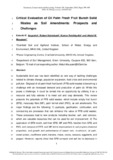JavaScript is disabled for your browser. Some features of this site may not work without it.
| dc.contributor.author | Anyaoha, Kelechi E. | |
| dc.contributor.author | Sakrabani, Ruben | |
| dc.contributor.author | Patchigolla, Kumar | |
| dc.contributor.author | Mouazen, Abdul M. | |
| dc.date.accessioned | 2018-06-26T13:53:20Z | |
| dc.date.available | 2018-06-26T13:53:20Z | |
| dc.date.issued | 2018-05-28 | |
| dc.identifier.citation | Anyaoha KE, Sakrabani R, Patchigolla K, Mouazen AM. (2018) Critical evaluation of oil palm fresh fruit bunch solid wastes as soil amendments: Prospects and challenges. Resources, Conservation and Recycling, Volume 136, September 2018, pp. 399-409 | en_UK |
| dc.identifier.issn | 0921-3449 | |
| dc.identifier.uri | https://doi.org/10.1016/j.resconrec.2018.04.022 | |
| dc.identifier.uri | http://dspace.lib.cranfield.ac.uk/handle/1826/13268 | |
| dc.description.abstract | Sustainable land use has been identified as one way of tackling challenges related to climate change, population expansion, food crisis and environmental pollution. Disposal of oil palm fresh fruit bunch (FFB) solid wastes is becoming a challenge with an increased demand and production of palm oil. Whilst this poses a challenge, it could be turned into an opportunity by utilising it as a resource and fully valorise it to meet soil and crop demands. This review presents the potentials of FFB solid wastes, which include empty fruit bunch (EFB), mesocarp fibre (MF), palm kernel shell (PKS), as soil ameliorants. The major findings are the following: 1) pyrolysis, gasification, combustion, and composting are processes that can enhance the value of FFB solid wastes. These processes lead to new products including biochar, ash, and compost, which are valuable resources that can be used for soil improvement. 2) The application of EFB mulch, ash from EFB, MF and PKS, biochar from EFB, and PKS, and compost of EFB, and MF led to improvement in soil physico-chemical properties, and growth and performance of sweet corn, mushroom, oil palm, sweet potato, cauliflower plant, banana, maize, cocoa, cassava, eggplants, and pepper. However, reports show that EFB compost and ash led to decrease in growth and performance of okra. Therefore, the use of appropriate conversion technology for FFB solid wastes as soil ameliorants can significantly improve crop yield and soil properties, reduce environmental pollution, and more importantly increase income of oil mill processors and savings for farmers. | en_UK |
| dc.language.iso | en | en_UK |
| dc.publisher | Elsevier | en_UK |
| dc.rights | Attribution-NonCommercial-NoDerivatives 4.0 International | * |
| dc.rights.uri | http://creativecommons.org/licenses/by-nc-nd/4.0/ | * |
| dc.subject | Empty fruit bunch | en_UK |
| dc.subject | Palm kernel shell | en_UK |
| dc.subject | Mesocarp fibre | en_UK |
| dc.subject | Ash | en_UK |
| dc.subject | Biochar | en_UK |
| dc.subject | Soil | en_UK |
| dc.title | Critical evaluation of oil palm fresh fruit bunch solid wastes as soil amendments: Prospects and challenges | en_UK |
| dc.type | Article | en_UK |
Files in this item
The following license files are associated with this item:
This item appears in the following Collection(s)
-
Staff publications (SWEE) [2815]

